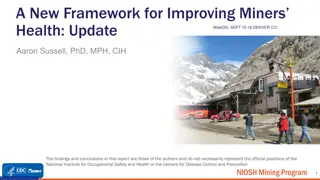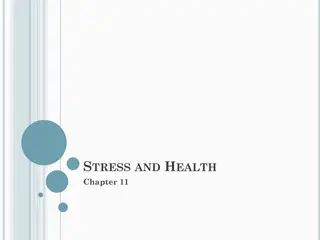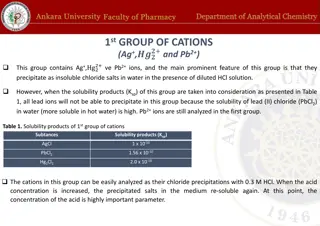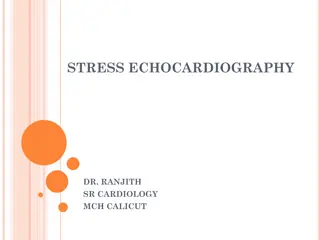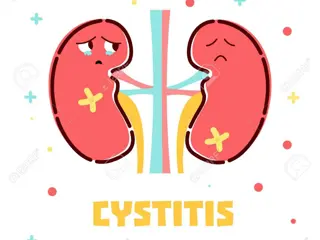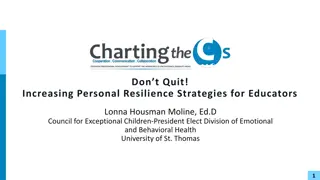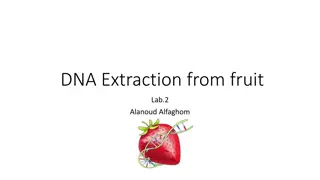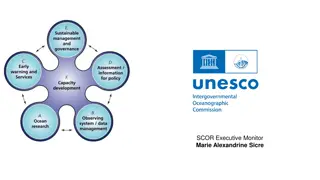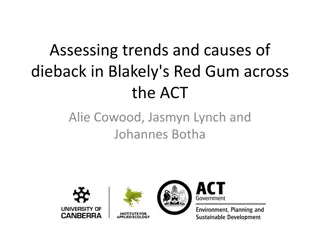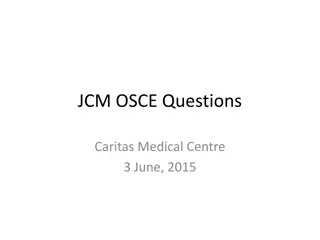Mastering Self-Management Skills for Success
Self-management skills are crucial for career success, enabling individuals to control their thoughts, emotions, and actions effectively. Key areas such as self-awareness, responsibility, time management, and adaptability play a significant role in achieving personal growth and productivity. Stress
2 views • 15 slides
Coping With Post- COVID Parents
Explore the challenges faced by parents post-COVID, including uncertainties, financial woes, and balancing responsibilities. Learn about the impact on families, multigenerational dynamics, and societal stressors. Discover insights on coping strategies and navigating a changed world.
1 views • 26 slides
Improving Miners' Health through New Framework
A new framework is introduced to enhance miners' health by addressing various stressors, hazards, and knowledge gaps in the mining industry. The project involves collaboration with NIOSH and emphasizes data exploration and systematic health data reviews to improve outcomes for miners.
0 views • 20 slides
Choosing the Best Humectant for Skin Hydration
This helps protect the skin from environmental stressors and irritants. Among the popular humectants are hyaluronic acid, glycerin, urea, and panthenol, each offering unique benefits for skin hydration and health.
3 views • 3 slides
Stress and Its Impact on Health
Stress is a multifaceted response to challenging events, affecting physical, emotional, cognitive, and behavioral aspects. It can be categorized into distress (resulting from negative stressors) and eustress (stemming from positive events). Cognitive appraisal plays a crucial role in determining how
0 views • 34 slides
Stress: Types, Stressors, and Body Response
This content discusses the different types of stress, including distress and eustress, various stressors such as biological, environmental, and cognitive factors, and how the body responds to stress through stages like alarm, resistance, and fatigue. It also explores the impact of excessive stress o
0 views • 11 slides
Stress: Types, Management, and Sources
Stress is a complex phenomenon affecting individuals differently. It is crucial to comprehend stress, its sources, and how to manage it effectively. Claude Bernard's concept of the internal environment sheds light on the negative aspects of stress. Stress can be categorized into eustress (good stres
2 views • 24 slides
Challenges and Rewards of Working with Public Safety - Insights from an EAP Specialist
Gain insights into the unique culture and stressors faced by first responders, and discover effective therapeutic approaches to support them. Learn about the similarities and differences between clinicians and first responders, along with the initial considerations when counseling these individuals.
0 views • 35 slides
Analysis of 1st Group of Cations: Ag+ and Pb2+ Ions
The analysis of cations in the 1st group involving Ag+ and Pb2+ ions is carried out by precipitating insoluble chloride salts in the presence of diluted HCl solution. The solubility products of AgCl, PbCl2, and Hg2Cl2 play a crucial role in the precipitation reactions. Various reagents such as HCl,
0 views • 7 slides
Gravimetric Analysis in Chemistry
Gravimetric analysis is a technique used to determine the amount of an analyte in a sample by converting it into a measurable product. This method provides high accuracy when performed correctly but requires skilled operators. An example involves determining the percentage of iron in a sample by pre
2 views • 27 slides
Gravimetric Determination of Chloride as Silver Chloride
This experiment involves precipitating chloride ions as silver chloride by adding silver nitrate to an acidified chloride solution. The resulting silver chloride precipitate is coagulated, filtered, and weighed to determine the chloride content gravimetrically. Factors affecting the solubility of si
0 views • 13 slides
Comprehensive Guide to Stress Echocardiography in Cardiology Practice
Stress echocardiography is a valuable tool in diagnosing and managing coronary artery disease, valvular heart disease, and assessing heart function. This imaging technique helps in detecting flow-limiting stenosis, understanding the ischemic cascade, and evaluating cardiac function during stress. Va
1 views • 49 slides
Coastal Conservation Strategies for Climate Resilience
Develop conceptual models for coastal conservation goals, targets, and management strategies in the context of climate change. Templates provided for reducing coastal flooding using natural areas, addressing non-climate and climate stressors, and implementing effective management strategies to enhan
3 views • 6 slides
Insights into Mentoring for New Principals in the Professional Community
The professional community emphasizes the importance of mentoring for new principals, citing major stressors like technical skill mastery and feelings of inadequacy. Mentoring is seen as a crucial tool in preparing effective school leaders, offering benefits such as increased job satisfaction and ca
0 views • 12 slides
Gravimetric Determination of Chloride in Analytical Chemistry
Gravimetric determination of chloride involves precipitating silver chloride from a soluble sample, filtering, drying, and weighing the precipitate to calculate chloride content. Reagents include concentrated HNO3, AgNO3, and NH3, and the procedure consists of steps such as washing, precipitation, f
0 views • 12 slides
The Role of Psychology in Aviation Safety Culture
Psychology plays a crucial role in building a culture of aviation safety by studying and preempting the psychological stressors faced by aviation staff. Aviation psychology focuses on human behaviors, cognitive functioning, and emotional processes in the complex aviation environment, with a history
0 views • 24 slides
Overview of Urinary Symptoms and Associated Infections
Collection of urinary symptoms like dysuria, frequency, and urgency caused by bladder inflammation, commonly due to E. coli infection from the GI tract. Cystitis, prevalent in women, rare in men, can resolve within 3 days without treatment. Additional symptoms, causes, and treatment options for cyst
1 views • 19 slides
Addressing Faculty Needs Amidst the Pandemic: Insights from UNC Charlotte Spring 2021 Focus Groups
UNC Charlotte conducted focus groups with pre-tenure faculty members in Spring 2021 to understand their challenges during the pandemic. Participants expressed feelings of institutional abandonment, low morale, and compounded stressors like personal health concerns and family caregiving. Communicatio
1 views • 8 slides
Don't Quit!: Strategies for Educator Resilience
This session focuses on increasing personal resilience for educators, addressing the stress and challenges they face in their roles. Explore strategies, research on teacher retention, and interventions to support educator well-being. Learn about common stressors, resilience techniques, and ways to m
0 views • 57 slides
Interactions Among Sectors and Complex Systems in Climate Change Assessment
Various sectors like energy, water, agriculture, and financial systems interact with each other, influencing and being influenced by climate-related stressors along with non-climate factors. Understanding these interactions is crucial for assessing and managing the risks posed by climate change, req
0 views • 13 slides
DNA Extraction from Fruit Lab: Strawberry Extraction Method
Explore the fascinating process of breaking cell barriers and extracting DNA from strawberry cells. This comprehensive lab guide provides detailed instructions on how to extract DNA using simple materials like strawberries, plastic bags, ethanol, liquid detergent, and more. From mashing the fruit to
2 views • 11 slides
Acute Diabetic Ketoacidosis in a 19-Year-Old Male
Acute presentation of a 19-year-old man with diabetic ketoacidosis (DKA) characterized by hyperglycemia, anion-gap acidosis, and ketosis. Clinical findings include dehydration, hyponatremia, hypotension, altered consciousness, and abdominal pain. Immediate management involves ABCs, fluid resuscitati
0 views • 16 slides
Collaborative Research Programmes in Ocean Science
Collaboration between the International Oceanographic Commission (IOC) and the Scientific Committee on Oceanic Research (SCOR) has led to successful research initiatives focusing on topics like Harmful Algal Blooms, Global Trends of Phytoplankton, Multiple Ocean Stressors, Microplastics, and more. O
0 views • 7 slides
Adaptation and Persistence in Healthcare Programs During Stressful Times
Amid external stressors like COVID-19 and political turmoil, healthcare programs in Peru have shown resilience and adaptability in shifting to tele-medicine, continuing alcohol consumption monitoring, and providing patient advice. Monitoring and evaluation remain essential in measuring program effec
0 views • 4 slides
Supporting Teacher Resilience in Slovakia: Challenges and Solutions
Teachers in Slovakia face various challenges in distance teaching, impacting their social-emotional health and resilience. This research project aims to explore the demanding nature of the teaching profession, common stressors affecting teachers' mental health, and the importance of social-emotional
0 views • 34 slides
Cell Injury and Degeneration in Response to Various Stressors
Cell injury can result from multiple stressors such as hypoxia, physical agents, chemicals, microbes, immunologic factors, nutritional imbalances, and aging. This can lead to reversible changes (degeneration) or irreversible changes (necrosis). Types of degeneration include cloudy swelling, hydropic
0 views • 22 slides
Assessment of Dieback Trends in Blakely's Red Gum Across ACT
Blakely's Red Gum and Yellow Box trees are vital in the Box Gum Grassy Woodland ecosystem. Dieback trends and causes were studied, with factors categorized as predisposing, precipitating, and modifying. Results indicated a decline in condition scores from 2004 to 2017 for both tree species. Various
0 views • 13 slides
Factors Contributing to Psychiatric Illness and Mental Health Issues
Factors contributing to psychiatric illness and mental health problems include predisposing factors such as psychological and biological factors, as well as precipitating stressors like challenging stimuli. Mental health is defined as a state of well-being involving happiness, contentment, and effec
0 views • 15 slides
Mental Health in Children: Factors and Concerns
Mental health in children is a critical aspect of their well-being. The World Health Organization defines mental health as a state of well-being where individuals can cope with life stresses and contribute positively to their community. Numerous factors, such as genetic predisposition, parental sepa
8 views • 9 slides
Clinical Case Study: Management of Thyrotoxic Periodic Paralysis
A 30-year-old man presents with bilateral lower limb weakness, weight loss, and abnormal ECG findings consistent with thyrotoxic periodic paralysis. The diagnosis, management steps, precipitating factors, and prophylactic medication are discussed. Additionally, a case of a 45-year-old chronic drinke
0 views • 48 slides
Banana DNA Extraction Process
Learn about conducting a simple experiment to extract DNA from bananas. The process involves mixing bananas with distilled water, adding shampoo and salt to break down cell membranes, filtering the mixture, and precipitating the DNA using isopropyl alcohol. This experiment provides a hands-on opport
0 views • 11 slides
The Vulnerability of Coral Reefs
Coral reefs, key coastal ecosystems, face various stressors such as bleaching and human pressures, impacting their ability to recover. With diverse reef types and environmental factors at play, the delicate balance of these underwater marvels is crucial for their survival. The special symbiotic rela
0 views • 21 slides
Pelvic Floor Dysfunction and Prolapse in Women
Pelvic floor dysfunction and prolapse are common issues affecting women, impacting their physical and emotional well-being. Surgical treatment may be necessary for symptomatic cases, but a thorough evaluation of symptoms, obstetric history, and other factors is crucial. Addressing precipitating fact
0 views • 72 slides
Newer Antianginals and Cardiomyocyte Metabolism
Chronic angina is a condition marked by impaired quality of life and decreased life expectancy, primarily due to myocardial ischemia. It is characterized by symptoms like tightness, heaviness, and pressure sensation, often located retrosternally. The pathophysiology involves a mismatch between oxyge
0 views • 73 slides
Health and Safety
Psychological stressors such as deployment, working conditions, and assigned tasks can have significant impacts on mental health and well-being. Recognizing signs of psychological stress, from physical to emotional and behavioral, is crucial in addressing and managing these challenges. This content
0 views • 16 slides
Factors Leading to HUD-VASH Eviction
Factors contributing to eviction from HUD-VASH, exits from permanent supportive housing, study objectives, methods, and analysis on potential correlates and precipitating events. Focus on identifying eviction signals and assessing utility of real-time data for service providers.
0 views • 15 slides
Determination of Chloride using Silver Nitrate Titration
Experiment involves precipitating chloride ions with silver nitrate followed by back titration with potassium thiocyanate to determine chloride concentration. Detailed procedure and calculations provided.
0 views • 8 slides
Health Psychology for Nursing
Stress is a state of mental tension and worry caused by various problems in life or work, leading to strong feelings of anxiety. Stressors are stimuli or sources that lead to stress, which can be internal (fear, guilt) or external (trauma, peer pressure). These stressors can be physiological, psycho
0 views • 20 slides
Stress and Stress Management History
Key concepts of stress, including the internal body environment and response to stressors, as explored through the history of stress research. Stress defined, types of stressors categorized, and distinctions between eustress and distress highlighted.
0 views • 24 slides
Reflecting on Work Stressors: Trauma-Exposed
Stressors unique to PPS and trauma-exposed work can impact individuals differently. Reflect on how you describe your work, what you feel comfortable discussing, and what you tend to hold back. Explore strategies to enhance self-care, improve work/life balance, and develop resilience to compassion fa
0 views • 11 slides


